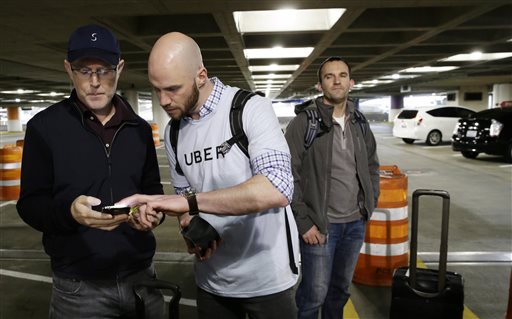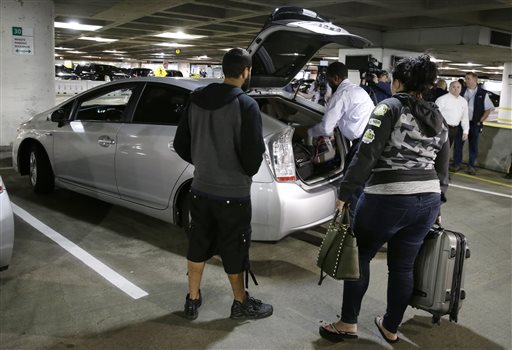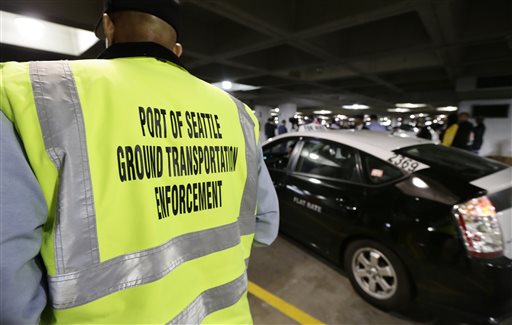Transit systems eye Uber, Lyft for savings on the disabled

Mitchel Matthews, center, senior operations manager for Uber Technologies Inc. in Washington state, helps a customer check on the status of his airport pick up ride using the Uber mobile app at Seattle-Tacoma International Airport, Thursday, March 31, 2016 in Seattle. Thursday was the first day that drivers for Uber, Lyft, and other ride sharing services could legally pick up and drop off customers at the airport. (AP Photo/Ted S. Warren)
BOSTON — Several U.S. transit systems looking to defray costs of providing services for the disabled are weighing partnerships with Uber and Lyft, unsettling some advocates who note that ride-hailing services have themselves faced criticism over accessibility.
Paratransit, better known under names like “The Ride,” ”Access-a-Ride,” or “Dial-a-Ride,” is required under the 1990 Americans with Disabilities Act. But the costs, which include door-to-door pickup and drop-off, can be steep.
The average cost of operating a single paratransit trip is about $23 in the U.S., compared with less than $4 for the average trip on bus or light rail. In Boston, the average cost per ride is about $45, in Washington, about $50, and in New York, nearly $57, officials said.
Transit agencies nationwide logged about 223 million paratransit trips at a cost exceeding $5.1 billion — about 12 percent of total transit operating costs — in 2013, according to the most recent data from the American Public Transportation Association. The price tag is particularly high in major cities, where agencies struggle with regular service and maintenance.
“I understand there are budget concerns. But for me this is a quality-of-life issue,” said Sarah Kaplan, 32, who was born with cerebral palsy and uses a wheelchair. She rides a vehicle operated by the Massachusetts Bay Transportation Authority to get to and from her job as internship coordinator with the Boston Center for Independent Living.
“I want the right to leave my house like everyone else,” Kaplan said.
In 2012, the MBTA doubled fares from $2 to $4 for The Ride, triggering protests; several people chained their wheelchairs together and blocked traffic. Fares were later rolled back to $3 for most rides.

A driver for the Lyft ride-sharing service loads luggage into his vehicle as his customers look on at Seattle-Tacoma International Airport, Thursday, March 31, 2016 in Seattle. AP
The deficit-ridden agency now hopes to cut $10 million in annual paratransit costs by expanding an existing taxi voucher system and contracting with ride-hailing services.
The plan, not yet finalized, would charge customers $2 per ride, while the MBTA contributes up to $13 for the trip. If a trip costs more than $15, the passenger would pay the difference.
A potential incentive for riders: Uber or Lyft can be summoned immediately with an app; trips on MBTA vehicles must be scheduled a day ahead.
“My guess is it will be very appealing to people who need to go shorter distances where the fares are under $15 and they can get an on-demand ride as opposed to booking 24 hours in advance,” said Brian Shortsleeve, the agency’s chief administrator.
But convenience comes with a catch.
With a limited number of wheelchair-accessible vehicles, the ride-hailing services would be available largely to people who can walk. And while a majority of individuals certified to use paratransit fit that bill, advocates worry about creating an unfair and possibly even illegal two-tiered system for the disabled — one serving people who can walk, the other those whose needs the private vehicles can’t accommodate.
“We don’t want racial segregation, and we also don’t want disability segregation,” said Marilyn Golden, senior policy analyst for the California-based Disability Rights Education & Defense Fund.
Uber and Lyft have both cited efforts to improve offerings for disabled riders. But the services have argued they are technology, not transportation, companies, meaning they are not required to provide accessible vehicles. Advocates for the disabled have filed a handful of lawsuits.
In January, a coalition including disability rights groups and labor unions wrote to the Washington Metropolitan Area Transit Authority, known as Metro, expressing alarm over the agency’s interest in contracting with companies such as Uber or Lyft.
“This is of grave concern to our coalition for many reasons, most importantly because neither company has adequate access to wheelchair accessible vehicles,” the letter stated. Passenger safety and inadequate driver training were also cited as concerns, though activists did applaud Metro for seeking alternative forms of transportation.

Carlton Wiliams, a Port of Seattle ground transportation enforcement worker, looks on as ride sharing vehicles pull into their approved passenger pick up area at Seattle-Tacoma International Airport, Thursday, March 31, 2016 in Seattle. (AP Photo/Ted S. Warren)
The system already supplements its MetroAccess service with alternatives such as Transport DC, which offers $5 taxi rides to the disabled, including wheelchair-accessible cabs.
Metro hopes to solicit formal proposals from ride-sharing companies this summer but will pay careful attention to how such a program is structured, said Christian Kent, assistant manager of access services.
Pace, which operates the Chicago-area paratransit system, has had preliminary meetings with Uber and Lyft, said agency spokesman Doug Sullivan. He cited as a potential barrier the strict federal guidelines that drivers for Pace — or any company under contract with Pace — must meet for training, and drug and alcohol testing.
A spokesman for New York’s Metropolitan Transportation Authority, the nation’s largest transit system, declined to say whether it had reached out to ride-hailing services but did say no agreements were in place.
The San Francisco Examiner reported last year that Uber was in talks to take over that city’s paratransit system, something that didn’t come to pass.
Uber did not provide details of current paratransit proposals, but the company has pointed to disability outreach efforts such as UberACCESS that connects riders with wheelchair-accessible vehicles.
In a statement, Lyft said it has been in discussions with transit officials in Boston and was monitoring developments in Washington with the hope of participating in paratransit programs in both cities. The company also said it was working to accommodate people with disabilities, citing a recent partnership with the National Federation of the Blind. TVJ